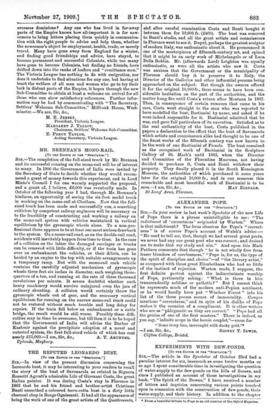MR. BRENNAN'S MONO-RAIL.
[To TIM EDITOR OF TIER " BrICTATOR.1 SIR,—The completion of the full-sized truck by Mr. Brennan and its successful running on the mono-rail will be of interest to many. In 1906 the Government of India were invited by the Secretary of State to decide whether they would recom- mend a grant of money towards this experiment, and in Lord Minto's Council I for one warmly supported the proposal, and a grant of, I believe, £6,000 was eventually made. In October of the following year I had, through Mr. Brennan's kindness, an opportunity of seeing the six-foot model truck in working on the mono-rail at Chatham. Now that the full- sized truck has been made and successfully run, a searching criticism by competent railway engineers will be necessary as to the feasibility of constructing and working a railway on the mono-rail, system with vehicles maintained in vertical equilibrium by the gyroscopic wheels alone. To a non-pro- fessional there appears to be at least one most serious drawback to the system. On a mono-rail road, as on the double-rail road, accidents will inevitably happen from time to time. In the case of a collision on the latter the damaged carriages or trucks can be removed with little difficulty, or if the train has gone over an embankment the vehicles, or their debris, can be hauled by an engine to the top with suitable arrangements up a temporary ramp. But with the mono-rail each vehicle contains the carefully adjusted mechanism of gyroscopic wheels three feet six inches in diameter, each weighing three- quarters of a ton, and running at the rate of three thousand revolutions per minute. It seems doubtful whether such heavy machinery would survive uninjured even the jars of ordinary shunting. A collision would certainly throw the gyroscopic wheels out of gear, and the necessary vertical equilibrium for running on the narrow mono-rail track could
not be restored without much trouble and long delay for repairs. If the train fell below an embankment or a cable bridge, the result would be still worse. Possibly these diffi- culties may in time be overcome, but till then it is to be hoped that the Government of India will advise the Darbar of Kashmir against the precipitate adoption of a novel and untested system, the first full-sized vehicle of which has cost nearly B15,000.—I am, Sir, &c., A. T. ARUNDEL. Uplands, Maybury.














































 Previous page
Previous page